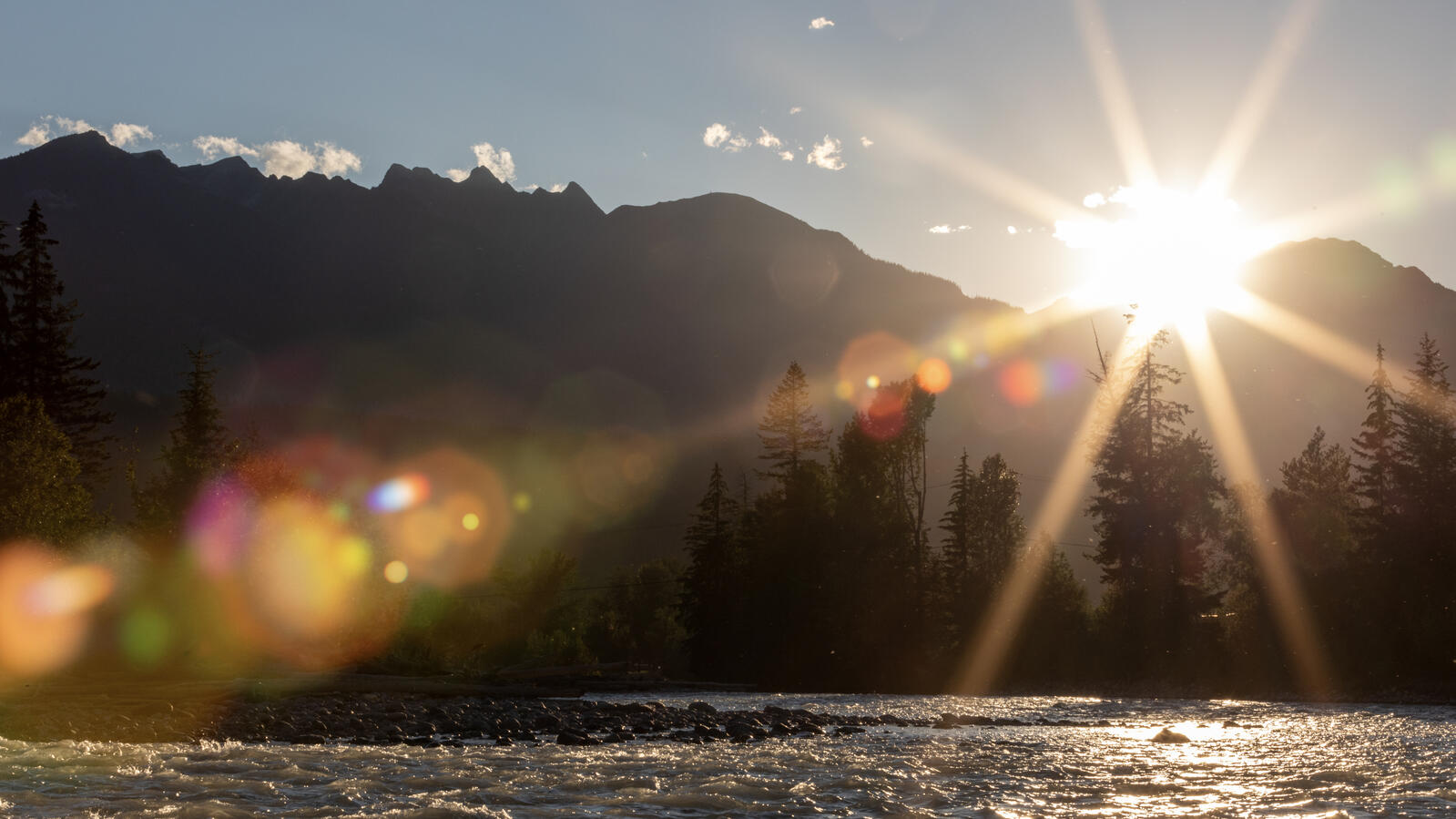
Ktunaxa-Nation
ʔaknuqⱡuk - Goldener Bereich
Before the Ktunaxa, it was the Spirit Animals that occupied the country. Our creation story speaks of the giant, Naⱡmuqȼin, and a prophecy from the Creator that would ultimately create all the Human Beings in the world. At that time there was some disturbance caused by a water monster known as Yawuʔnik̓, who killed many creatures. A war party was formed to destroy Yawuʔnik̓. He was pursued amongst the Kootenay and Columbia River Systems. Yawuʔnik̓ was eventually killed and butchered; his meat distributed among the animals so everyone was fed. His organs were removed and became the various races of people and were scattered throughout the world. The events placed the Ktunaxa people here in our ancestral homelands – as stewards of the land. The lakes and rivers are a testament of this feat as are Yawuʔnik̓’s ribs, known as the Hoodoos, seen throughout the region. When the prophecy was fulfilled, Naⱡmuqȼin, in all his excitement, rose to his feet, standing upright, hitting his head on the ceiling of the sky and knocking himself dead. His feet lay northward in a place we call Ya·kⱡiki, in the Yellowhead Pass vicinity. His head went south and rests near Yellowstone Park in the State of Montana and his body is now known as the Rocky Mountains. For more information on the creation story visit: http://www.ktunaxa.org/who-we-are/creation-story/
The Ktunaxa People
Unsere Ktunaxa-Sprache ist einzigartig in unserem Heimatland und mit keiner anderen Sprache der Welt verwandt. Wir sind sehr stolz auf diese Tatsache - dass wir etwas so Besonderes haben, das so einzigartig für unser Gebiet und unsere Nation ist. Es ist uns jedoch nicht entgangen, dass unsere Sprache mit weniger als einem Dutzend fließend Sprechenden auf der Welt stark gefährdet ist. Wir arbeiten daran, unsere Sprache zu bewahren und den jungen Menschen beizubringen, dass sie stolz auf ihre Sprache und auf das, was sie sind, sein können. Unsere Kultur ist in unsere Sprache eingebettet und lehrt uns durch unsere Geschichten und Lieder, wer wir sind und woher wir kommen. Ähnlich wie unser Wort für Golden. In Ktunaxa ist unser Wort für die Stadt Golden ʔaknuqⱡuk - ein Wort, das die Farbe des Wassers beschreibt, das in den Columbia fließt. Es besagt, dass es schlammig oder schluffig ist und dadurch weiß aussieht.
The primary game of ʔaknuqⱡuk is elk, moose and deer. You can find all the major food groups: elk, mountain goats, mountain sheep, moose, deer and bear. When the Ktunaxa lived and moved freely throughout their homelands, many Ktunaxa families lived along the upper Columbia River (Miȼ̓qaqas) from its headwaters through and including ʔaknuqⱡuk working the land and harvesting wild vegetation. Hunting trails extend throughout the area and tie in with several portage trails all the way north to Boat Encampment and connect with the trail over Athabasca Pass to Jasper House. These trails also connected to the prairies in Alberta where the Ktunaxa hunted buffalo 2 or 3 times a year. Many of these passes are still known today such as Howse Pass that connects to Jasper House. Another trail branches out and connects to the Selkirk Mountains north of present-day Golden toward Revelstoke (Ktunwakanmituk miȼ̓qaqas). These trails preceded mining settlements and are attributable to the Ktunaxa and latterly by the Kinbasket before becoming the highways you travel by car. The Ktunaxa utilized many resources here in ʔaknuqⱡuk and it was important as a “mustering point” connecting travellers from all directions, much as it still does today. The relief you experience coming out of the mountain pass to meet up with your group, grab a meal or relieve yourself before making the next move were all as important then as it is today.
A captivating story of early Golden from Colleen Palumbo recalls in the early 1900’s Louis Rauch a young man in his 20’s while hunting in the Big Bend Country climbed on top of a bluff hoping to catch better sight of some game, as he adjusted his stance slipped on the snow and fell from the bluff fracturing his leg rendering him immobile. He lay in the snow for a couple of days before his calls for help were heard by a passing group of Ktunaxa on their way back to the Invermere area. The group, realizing they couldn't move him made the decision to leave a family behind with enough provisions to get them through the winter. Because of the kindness of the Ktunaxa the descendants of the Rauch family are here today to share the story with the Ktunaxa families who share in the historic experience.